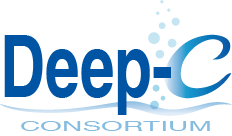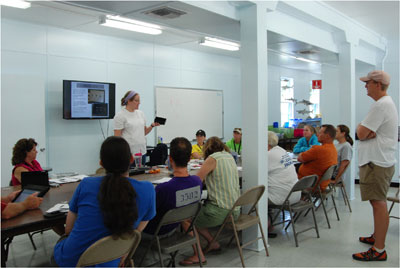Marine technology provides educators with an innovative teaching tool
ROV training arms teachers with new skills, materials, and inspiration
|
|
July 31, 2013 -- Earlier this month, teachers from around the state of Alabama and several from Florida converged at Dauphin Island Sea Lab (DISL) for some “high tech” teacher training. A five-day workshop, entitled Technology in Marine Science, introduced 10 high school educators who teach environmental science, marine science, engineering, physics, or physical science to the exciting world of ROVs (Remotely Operated Vehicles)… and, most importantly, how they can be used as teaching tools in their classrooms.
Participant Greg Ennis, a Madison High School engineering and physics teacher, commented, “The ocean floor is one of the last great unexplored frontiers on Earth. (ROVs) are a great opportunity to get students involved in an expanding Science, Technology, Engineering and Mathematics (STEM) field.” (Source: The Madison Record)
Workshop attendees learned how ROVs are used to explore, research, and work in ocean waters too deep or dangerous for humans. The training also covered a wide range of topics from wiring ROV motors to using real-time data in the classroom. Participants were then able to build and fly their own underwater robots and experiment with ways in which to help students understand the essential properties of ROV construction — density and buoyancy!
“Our programs are intended to increase understanding and appreciation for science and the marine environment by directly involving participants in that environment with dynamic, hands-on activities,” says Dr. Tina Miller-Way, Chair of DISL Discovery Hall Programs. “So the ROV training included field experience aboard the RV [research vessel] Alabama-Discovery where everyone got a chance to drive a research quality ROV, use a bit of typical sampling gear, and see some inshore and offshore trawls. ROVs are a great way to integrate ocean literacy and STEM efforts in schools. ”
 Jacksonville, AL high school teachers Caroline Godbey and Susanne Mullinax put the finishing touches on their ROV. (Photo credit: Tina Miller-Way, DISL) |
 The whole crew ready to test their engineering skills in the DISL pool. (Photo credit: Tina Miller-Way, DISL) |
|
|
These teachers will now return for the 2013-14 school year armed with new skills, materials, and inspiration… which they will, in turn, impart to students. Throughout the coming year, they will encourage their students to create, test, and modify their own ROVs. Student teams (and their ROVs) will then travel to DISL in order to compete in an ROV competition in the spring.
Designs and determination will be tested through a series of “missions,” team presentations and interviews by a panel of judges. Joining these student teams will be those who competed in the first Deep-C/DISL competition. (See highlights, including a video, from the inaugural ROV Competition held in Spring 2012.)
“An exciting development is that we [DISL] are in the process of becoming a regional competition center for the internationally renowned MATE (Marine Advanced Technology Education) ROV competition,” says Dr. Miller-Way. “That means the winner of our spring 2013 contest will be eligible to compete at the international competition at Thunder Bay National Marine Sanctuary in June of 2014!” (Learn more about the 2012 MATE International ROV Competition.)
In the meantime, last year’s ROV teacher training and competition inspired two Tallahassee educators to organize a local competition between area high schools. Deep-C will sponsor the event, tentatively scheduled for December 2013. Stay tuned for more information…
“The ROV teacher trainings at Dauphin Island Sea Lab are one of several educator workshops Deep-C has hosted,” says Amelia Vaughan, Deep-C Ocean Science Educator. “For instance, last March we sponsored an all-day workshop on building water temperature sensors (SENSE-IT).”
“Providing these experiences and tools to K-12 teachers is such an important part of our Consortium’s education and outreach mission,” says Tracy Ippolito, Deep-C Coordinator. “As scientists and educators, we hope to instill in students some level of the wonder and awe we feel in discovery. And we accomplish that through innovative activities such as the Deep-C ROV competitions.”
If you would like more information about educator resources and events sponsored by Deep-C, or if you are interested in becoming involved in the Tallahassee ROV competition, please This email address is being protected from spambots. You need JavaScript enabled to view it., Ocean Sciences Educator.
 Taking a break from the classroom to collect specimens aboard the R/V Alabama Discovery. (Photo credit: Tina Miller-Way, DISL) |
|
 Fairview High's Stephanie Chambers tests drives DISL's ROV out at sea. (Photo credit: Tina Miller-Way, DISL) |
The Deep-C (Deep Sea to Coast Connectivity in the Eastern Gulf of Mexico) Consortium is a long-term, interdisciplinary study of deep sea to coast connectivity in the northeastern Gulf of Mexico. The study is investigating the environmental consequences of petroleum hydrocarbon release in the deep Gulf on living marine resources and ecosystem health. Deep-C research is made possible by a grant from BP/The Gulf of Mexico Research Initiative.
 |
This email address is being protected from spambots. You need JavaScript enabled to view it. is an ocean sciences educator for the Deep-C Consortium and a graduate student in Library and Information Sciences. Her love for the ocean started at the tide pools in her home state of Oregon and has led her to teach ocean science all over the country from the Channel Islands to the Long Island Sound. She is passionate about education and connecting students with Deep-C research!
 |
Dr. Tina Miller-Way is Chair of Discovery Hall Programs for Education and Outreach at the Dauphin Island Sea Lab (DISL). The lab, located in southern Mobile County off Alabama's Gulf Coast, is well-known for their excellence in education and outreach programming. As a marine laboratory, DISL's mission encompasses marine science education, marine science research, coastal zone management policy and educating the general public through the Estuarium, Dauphin Island Sea Lab's public aquarium. The lab partners with more than 20 colleges and with primary schools to offer marine science coursework up to the graduate level. The research programs of the Dauphin Island Sea Lab range from biogeochemistry and oceanography to systems ecology. Most research focuses on the near-shore and estuarine processes of Mobile Bay, field sites of our internationally-renowned faculty include Mexico, Australia, and Croatia and other countries.
Deep-C was a four-year, interdisciplinary study of deep sea to coast connectivity in the northeastern Gulf of Mexico.Deep-C is no longer an active research project. The information on this website is for historical reference purposes only.
Home | About Us | Research Areas | Data Center | News & Multimedia | Education & Outreach
© Deep-C Consortium. All Rights Reserved.
This research was made possible by a grant fromThe Gulf of Mexico Research Initiative (GoMRI).
Copyright | Disclaimer | Privacy Policy

 DISL instructor Carrie Dixon-Riley explains in the intricacies of wiring ROV motors to workshop participants. (Photo credit: Tina Miller-Way, DISL)
DISL instructor Carrie Dixon-Riley explains in the intricacies of wiring ROV motors to workshop participants. (Photo credit: Tina Miller-Way, DISL) James Clemens High School teacher Greg Ennis manning the tether while his partner pilots their ROV. (Photo credit: Tina Miller-Way, DISL)
James Clemens High School teacher Greg Ennis manning the tether while his partner pilots their ROV. (Photo credit: Tina Miller-Way, DISL)